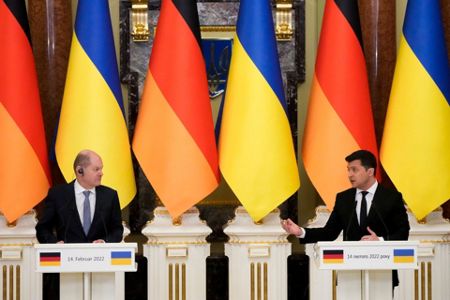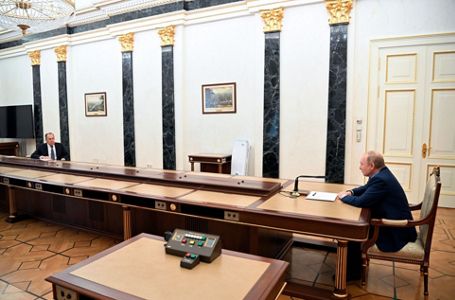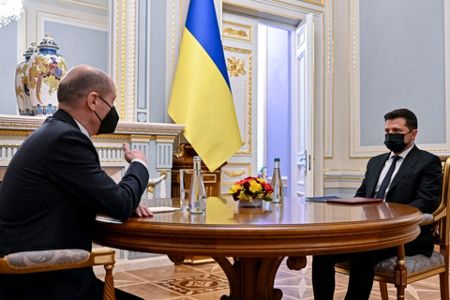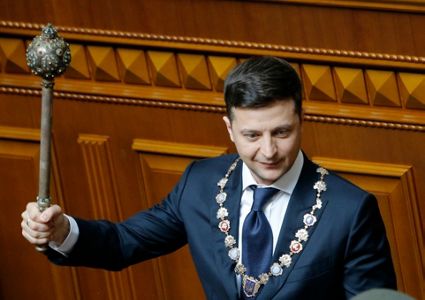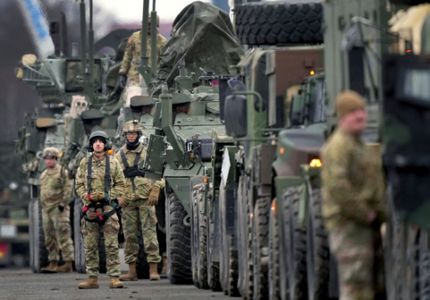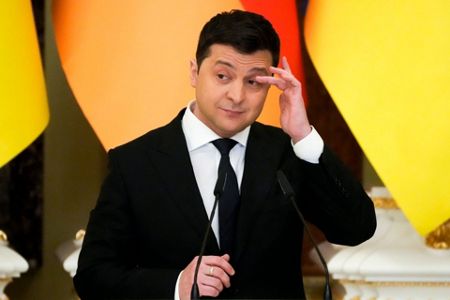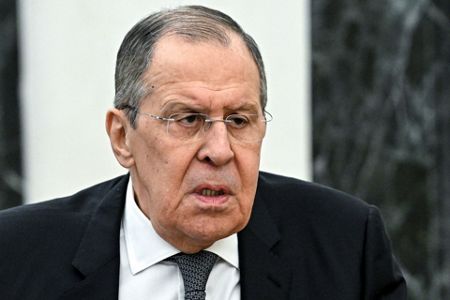BERLIN (AP) — Diplomatic efforts to head off what U.S. officials have warned could be an imminent Russian attack on Ukraine entered a new round on Monday. Russia's top diplomat advised President Vladimir Putin to continue talks and Germany's chancellor met the Ukrainian president.
Nonetheless the U.S. announced it is closing its embassy in Ukraine and moving all remaining staffers there to a city near the Polish border.
Earlier, Britain's prime minister said Europe is “on the edge of a precipice,” citing an American warning that Russia could invade Ukraine in the next 48 hours.
Here’s a look at what is happening where and why:
WHAT'S THE MESSAGE FROM RUSSIA?
The Kremlin signaled Monday that it is ready to keep talking with the West about security grievances that led to the current crisis, offering hope that Russia might not invade Ukraine within days as Western officials increasingly fear.
In an appearance orchestrated for TV cameras, Russian Foreign Minister Sergey Lavrov argued that possibilities for talks haven’t been exhausted. That seemed designed to send a message that Putin himself believes hopes for a diplomatic solution haven’t yet faded.
Lavrov said the talks “can’t go on indefinitely, but I would suggest to continue and expand them at this stage." He noted that Washington has offered to discuss limits for missile deployments in Europe, restrictions on military drills and other confidence-building measures.
Asked by Putin if it made sense to continue diplomatic efforts, Lavrov responded that possibilities for talks “are far from being exhausted” and he proposed to continue the negotiations. He said his ministry wouldn’t allow the U.S. and its allies to stonewall Russia’s main requests.
U.S. officials responded they're looking for actions, not merely talk. “If Foreign Minister Lavrov’s comments are followed up with concrete, tangible signs of de-escalation, we would certainly welcome that,” State Department spokesman Ned Price told reporters. "We have not seen that yet.”
WHAT'S THE LATEST U.S. ACTION?
The United States said Monday it will close its embassy in Ukraine and move all remaining staffers there to a city near the Polish border as invasion fears intensify. It also repeated warnings to private American citizens in Ukraine to leave immediately.
The State Department announcement follows a decision it took over the weekend to order the departure of all non-essential diplomats from Kyiv. The embassy will now suspend operations and the property will be looked after by local Ukrainian security guards.
A small number of embassy staff from Kyiv will relocate to Lviv, where they will provide limited consular services to Americans and keep communications open with the Ukrainian government, the department said.
Meanwhile, the Pentagon announced that Defense Secretary Lloyd Austin will go to the NATO defense ministerial in Brussels this week, and will also visit Poland and Lithuania, neighbors to Ukraine. Pentagon press secretary John Kirby said Austin will meet with the presidents, defense ministers and other key leaders in Poland and Lithuania, as well as U.S. forces in those countries. Kirby said Austin also is planning to have a trilateral meeting with the defense chiefs of the three Baltic nations, Lithuania, Latvia and Estonia.
WHAT'S GOING ON IN UKRAINE?
German Chancellor Olaf Scholz brought a message of solidarity to Kyiv, telling Ukrainian President Volodymyr Zelenskyy that Ukraine's sovereignty and territorial integrity are not negotiable.
Scholz, whose visit came ahead of a meeting with Putin in Moscow on Tuesday, demanded “clear steps to de-escalate the current tensions” from Russia. He thanked the Ukrainian government for its “sober and restrained reaction to a very serious and threatening situation."
Scholz noted that NATO and the U.S. have made proposals to Moscow that Germany supports, “and we now expect a reaction, an answer to them from Russia.” He urged Russia to accept offers of dialogue.
The German chancellor said in case of military escalation, “we are ready for very far-reaching and effective sanctions in consultation with our allies" and that “we know what to do" if Russia were to violate Ukraine’s territorial integrity again.
Zelenskyy called the tensions around his country’s future “an unprecedented challenge for Europe and the world.”
“It is in Ukraine that the future of the European security architecture — of which our state is a part — is being decided today.”
Separately, U.N. Secretary-General Antonio Guterres held talks Monday with the foreign ministers of Russia and Ukraine and again underlined that “there is no alternative to diplomacy” to resolve the dispute over Ukraine.
WHEN COULD RUSSIA MAKE ITS MOVE?
British Prime Minister Boris Johnson says Europe is “on the edge of a precipice,” citing an American warning that Russia could invade Ukraine in the next 48 hours.
“But there is still time for President Putin to step back,” Johnson said.
U.S. officials said the Russian military has continued its buildup and apparent attack preparations along Ukraine’s borders.
A U.S. defense official said that for several days small numbers of Russian ground combat units have been moving out of larger assembly areas to positions closer to the Ukrainian border, what would be departure points if Putin launched an invasion.
The official spoke on condition of anonymity to discuss information not publicly released. CBS News was first to report on the movement of units closer to the border.
Separately, the head of Sweden’s military forces said Russia has “all the needed capacity along the Ukrainian border for a military operation.”
“We do not exclude anything,” Gen. Micael Byden, whose country is not a NATO member. “Whether it happens today, on Wednesday or a week, we do not know.”
AND WHAT IF TALKS DON'T SUCCEED?
Poland is making preparations to accept Ukrainian refugees in the event of another Russian attack on its neighbor. But the Polish government hopes that worst-case scenario can be averted.
Similar preparations are being made across the region, particularly in nations that border Ukraine.
Poland, which has welcomed large numbers of Ukrainian economic migrants in recent years, particularly after Russia’s incursions into Ukraine in 2014, has been making plans for weeks to accept refugees if it comes to that, said Marcin Przydacz, a deputy foreign minister.
HOW IS UKRAINE'S PRESIDENT FARING?
Zelenskyy won a landslide victory in 2019. As a political novice making an unlikely bid for the job, he had vowed to reach out to Russia-backed rebels in the east who were fighting Ukrainian forces and make strides toward resolving the conflict.
But Zelenskyy is watching his once-enormous support dissolve as Ukraine faces fears of a Russian invasion that could not only take the rebel regions but possibly the rest of the country.
To make matters worse, the incumbent whom Zelenskyy defeated in 2019 has boldly returned to the country to face charges of treason and stir up opposition to him. Analysts suggest that Moscow is seeking to bolster support among pro-Russia politicians in Ukraine and that the buildup of Russian forces near Ukraine’s border is aimed partly at destabilizing the country’s politics.
——
Yuras Karmanau in Kyiv, Ukraine, Vladimir Isachenkov in Moscow, Jill Lawless in London, Vanessa Gera in Warsaw, Poland, and Jan M. Olsen in Copenhagen, Denmark, contributed to this report.
Copyright 2022 The Associated Press. All rights reserved. This material may not be published, broadcast, rewritten or redistributed without permission.


